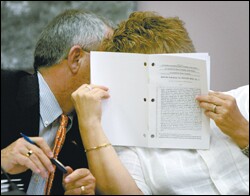Kansas lawmakers appropriated $148 million last week in K-12 spending to comply with an order from the state supreme court in a long-running school finance case.
Read the related stories:
After almost two weeks of debate in a special session, Democrats and moderate Republicans passed a supplemental-spending bill to essentially double the increase the legislature previously appropriated for the 2005-06 school year.
The bill appears to meet the Kansas Supreme Court’s order last month for an increase in school spending by $143 million above what had been approved for the coming school year during the legislature’s regular session. Gov. Kathleen Sebelius, a Democrat, issued a statement shortly after the legislature passed the bill on July 6 supporting the bill.
“We hopefully have averted this first deadline, and … then we determine where we go from here,” said Sen. Jean Schodorf, the Republican from Wichita who is the chairwoman of the Senate education committee.
The court heard arguments July 8 by the state attorney general and plaintiffs in the finance case over whether the legislature had fully complied with the order to increase spending and ensure school financing is equitably distributed throughout the state.
Authority Questioned

The Kansas legislature acted after many lawmakers publicly questioned the court’s authority to order them to appropriate funds. During the special session, the House and the Senate considered several amendments to the state constitution that would have curtailed the court’s authority to issue such orders in the future. None of them won a two-thirds majority in both chambers. If one had passed, voters would have had to approve it before it became part of the constitution.
On June 3, the supreme court said that the $2.4 billion the legislature had approved for schools in 2005-06 was not enough to provide a “suitable” education, which the Kansas Constitution guarantees all students in the state. The order was the remedy in the finance case, filed in 1999 by students and school districts.
The court ordered the legislature to appropriate an additional $143 million for the new school year. It also said it might order lawmakers to give schools an additional $568 million for the 2006-07 school year.
To respond to the order, the legislature would use $79 million that flowed into the state’s coffers in May and June. It also relied on updated estimates that projected tax revenues would increase by $79 million more than what was expected when lawmakers passed their fiscal 2006 budget.
The plaintiffs’ lawyer said late last week he and his clients were reviewing the legislature’s bill and hadn’t decided whether to object to some of its provisions.
Although the legislators proclaimed that their bill would provide an additional $148 million for schools, $27 million of that is state financing to offset property-tax relief in some poor districts, said Alan L. Rupe, the Wichita lawyer representing the plaintiffs. “That is moving money from one account to another,” he said. “It is not new money.” He said the legislators “arguably could be short” of meeting the court’s order.
But Mr. Rupe said the plaintiffs might tell the court that they were satisfied with the legislature’s work.
“It’s the best effort that we saw during the [special] session,” he said.
Even if the court approves the legislature’s work, Ms. Schodorf and other lawmakers said the state would struggle to appropriate an additional $568 million for the 2006-07 school year. The state’s general-fund budget is about $7 billion. “That is a huge amount of money for a state the size of Kansas,” Ms. Schodorf said. “This next one is going to be very difficult.”
“If that is enforced next year, that will bankrupt the state of Kansas,” said Sen. Kay O’Connor, a conservative Republican, who predicted the legislature would need to increase taxes by 25 percent to raise the money.
The court based its request for the additional increase on a 2001 study by school finance experts hired by the legislature. It did say it would review any new study conducted for the legislature before lawmakers meet in their next session, scheduled for January. The court left open the possibility of lowering that figure.
As part of the funding bill, the legislature also commissioned a study by its staff to determine how much the state needs to spend to provide a suitable education as required by the constitution. Ms. Schodorf said she expects the study to provide a figure similar to the 2001 study cited by the court.
Ms. O’Connor opposed last week’s bill because it didn’t include a constitutional amendment that would declare that the court may not order the legislature to appropriate money.
“Our federal and state constitutions were designed to limit the accumulation of power to avoid the subsequent abuse of that power,” said John Dayton, a professor of education at the University of Georgia and a school finance expert. “Shifting more power to one branch of government while limiting the ability of another branch of government to act as an effective check and balance on that branch of government in the future could have serious long-term consequences.”




